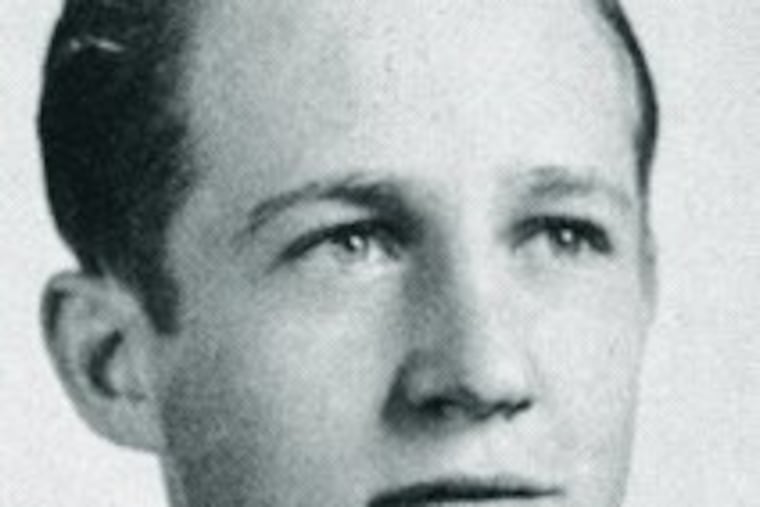Ties to the prize: laureate grew up in Bucks
After horror of WWII, a boy's new start here leads to Nobel.

Mario Capecchi, co-winner of a 2007 Nobel Prize for medicine, was a malnourished, unschooled, 9-year-old Italian street urchin who spoke no English when he arrived at a Bucks County commune in 1946.
Looking back, he sees that traumatic transition as a defining experience, one that shaped his personality and intellect.
"It juxtaposed two opposites," the soft-spoken molecular biologist said yesterday by phone from the University of Utah in Salt Lake City, where he is a professor of genetics. "Initially, I led an asocial life. Then I joined a community started by the Quakers that was more like a commune. It was very social, and everybody knew everything about everybody. It was a terrific place to grow up.
"The only bad thing," he added, "was that my poor aunt and uncle got an uncivilized kid and had to socialize him."
That self-deprecating view is classic Capecchi.
"He is very humble and down-to-earth," said Nancy Starmer, head of George School in Newtown, the Quaker high school from which Capecchi graduated in 1956. "He is very grateful for his experiences here. In 2001, I teased him that the George School Alumni Award was his biggest prize."
By then, Capecchi had won almost every major prize in science except a Nobel, including Philadelphia's Franklin Medal. (George School, however, can boast another Nobel-winning alumnus - physicist Kenneth Wilson in 1982.)
Capecchi's pioneering research on "gene targeting" has enabled scientists to create mice with any desired mutations in any desired gene, giving researchers almost godlike power to manipulate and study development.
His achievements are all the more stunning, considering that his early childhood was horrific. As George School's magazine observed, a summary of those early years sounds like a melodramatic play.
Capecchi and his mother - beautiful, free-spirited and unmarried - lived an idyllic life in the Italian Alps until she was arrested by the Nazis and sent to Dachau for opposing fascism.
A Tyrolean peasant family, paid by his mother to care for the child, abandoned him when he was 41/2. He begged and stole, becoming as desperate and distrustful as a feral cat.
Then, when he was 9, World War II ended, his mother tracked him down in a hospital, and they emigrated to America to live with her brother and sister-in-law, Edward and Sarah Ramberg.
The Rambergs' home was in Bryn Gweled, meaning "Hill of Vision," a wooded oasis in Upper Southampton Township. To this day, homesteading families live on 240 acres of collectively owned land.
Bill Dockhorn, who still lives there, went to elementary and high school with Capecchi. He had no idea at the time that his childhood chum had survived hardships.
"He had never told his friends about this past story until about 10 years ago, when he started getting all those prizes," Dockhorn said yesterday. "His mother didn't live with his aunt and uncle for long after they came to the U.S.; she still had a lot of psychological problems from being interned" in Dachau.
Dockhorn, who had a reunion with Capecchi two months ago in New Mexico, recalled him as a talented baseball player, wrestler and artist.
"When he first came to school, he couldn't speak English, so he drew pictures," Dockhorn said.
During those formative years in Bucks County, Capecchi was exposed to many scientists and engineers, not to mention progressive social views.
"Mario's uncle was a physicist; he and two other neighbors worked at the research labs in Princeton," Dockhorn said.
Capecchi's own brilliance was soon obvious, and by the time he earned his doctorate in biophysics from Harvard University in 1967, he was under the tutelage of no less than James D. Watson, a co-discoverer of the structure of DNA.
Even so, when Capecchi and his colleagues at the University of Utah sought funding from the National Institutes of Health for their gene-targeting research in 1980, they were rejected.
"They simply thought the project was not feasible," Capecchi said yesterday. "And that wasn't an unreasonable conclusion. But we felt we could do it. Fortunately, I was able to divert funds from another project."
About five years later, Capecchi's team again sought funding, this time with evidence that their theories were valid.
"You get an evaluation of your proposal called 'a pink sheet.' It said, 'We're glad you didn't take our advice last time.' At least they had a sense of humor about it."
Capecchi was aware that the Nobel committee was considering him and his co-winners - Oliver Smithies of the University of North Carolina and Martin Evans of Cardiff University in Wales. Still, when he got the call most scientists only dream of, he was floored.
"Nobody ever expects a Nobel Prize," Capecchi said. "They're looking at hundreds of people."
One of the first calls he and his wife, Laurie Fraser, made was to their daughter, Misha, a George School graduate now studying in California.
"Woke her up early in the morning," Capecchi said.
But people from the place that changed his life also made the call list.
"I feel very close to Philadelphia," he said. "Those were very good years for me."
Mario Capecchi talks about the 2007 Nobel Prize via http://go.philly.com/science
EndText